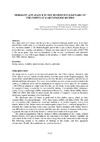Please use this identifier to cite or link to this item:
https://accedacris.ulpgc.es/jspui/handle/10553/57270
| DC Field | Value | Language |
|---|---|---|
| dc.contributor.author | Alonso-Almeida, Francisco | en_US |
| dc.contributor.author | Cruz García, Laura | en_US |
| dc.date.accessioned | 2019-10-22T11:47:43Z | - |
| dc.date.available | 2019-10-22T11:47:43Z | - |
| dc.date.issued | 2009 | en_US |
| dc.identifier.isbn | 978-84-7756-804-9 | en_US |
| dc.identifier.uri | https://accedacris.ulpgc.es/handle/10553/57270 | - |
| dc.description.abstract | Our paper addresses two main issues related to the concept of evidentiality. The first one refers to the lack of studies in the field in English, especially as for the grammatical marking of evidentiality. Some authors (Lazard, 2001) claim that English does not hold grammatical markers for the source of knowledge in contrast to other languages, e.g. Quechua, which seems to do so. Dendale and Tasmowski (2001), however, think that grammatical evidentials are possible in English, and that more research should be done in order to identify and categorize these. The second issue deals with the relationship of evidentiality and stance. Evidentiality understood in its broad sense allows for the interpretation of authorial intention and degree of certainty in their use of expressions indicating their sources of knowledge. In our view, the use of evidential marking rarely is free from the imprint of the author, and hence other meanings rather than sources of knowledge should be taken into account. In our study we will concentrate on modal verbs to show (i) their value as grammatical evidential markers, and (ii) their value as stance markers to show the author’s attitude to the proposition manifested. For this, we use a corpus of about 30 medical research papers published in 2008. | en_US |
| dc.language | eng | en_US |
| dc.publisher | Universidad de La Laguna | en_US |
| dc.source | Las lenguas para fines específicos ante el reto de la Convergencia Europea. VIII Congreso Internacional AELFE, Universidad de La Laguna, 3, 4 y 5 de septiembre de 2009 / coord. por Estefanía Caridad de Otto, Alejandro F. López de Vergara Méndez. p. 349-358 | en_US |
| dc.subject | 57 Lingüística | en_US |
| dc.subject | 5701 Lingüística aplicada | en_US |
| dc.subject.other | Stance | en_US |
| dc.subject.other | Evidentiality | en_US |
| dc.subject.other | Modal verbs | en_US |
| dc.subject.other | Epistemic meaning | en_US |
| dc.subject.other | Medical discourse | en_US |
| dc.title | Evidentiality and stance in medical research papers | en_US |
| dc.type | info:eu-repo/semantics/conferenceObject | en_US |
| dc.type | ConferenceObject | en_US |
| dc.investigacion | Artes y Humanidades | en_US |
| dc.type2 | Actas de congresos | en_US |
| dc.description.notas | Recoge los contenidos presentados a: Congreso Internacional AELFE (8. 2009. La Laguna) | en_US |
| dc.identifier.ulpgc | Sí | es |
| item.grantfulltext | open | - |
| item.fulltext | Con texto completo | - |
| crisitem.author.dept | GIR Discourse, Communication and Society | - |
| crisitem.author.dept | Departamento de Filología Moderna, Traducción e Interpretación | - |
| crisitem.author.dept | GIR IDETIC: División de Traducción e Interpretación y Aprendizaje de Lenguas | - |
| crisitem.author.dept | IU para el Desarrollo Tecnológico y la Innovación en Comunicaciones (IDeTIC) | - |
| crisitem.author.dept | Departamento de Filología Moderna, Traducción e Interpretación | - |
| crisitem.author.orcid | 0000-0003-4676-3831 | - |
| crisitem.author.orcid | 0000-0001-7826-0142 | - |
| crisitem.author.parentorg | Departamento de Filología Moderna, Traducción e Interpretación | - |
| crisitem.author.parentorg | IU para el Desarrollo Tecnológico y la Innovación en Comunicaciones (IDeTIC) | - |
| crisitem.author.fullName | Alonso Almeida, Francisco Jesús | - |
| crisitem.author.fullName | Cruz García, Laura | - |
| Appears in Collections: | Actas de congresos | |
Page view(s)
47
checked on Jan 11, 2026
Download(s)
16
checked on Jan 11, 2026
Google ScholarTM
Check
Altmetric
Share
Export metadata
Items in accedaCRIS are protected by copyright, with all rights reserved, unless otherwise indicated.
